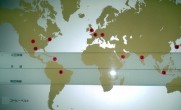
by Fakhri al-Arashi
Through out the international coffee conference all over the world , Japanese coffee traders classified Yemen as the homeland of coffee and the first source of the coffee tree in the world. The Japanese adore coffee, much akin to westerners’ passion for wine. Despite its small quantities, the quality and price of Yemeni coffee have earned it a special category in the Japanese coffee market. The sole coffee store in Tokyo that serves Yemeni coffee offers cups from $15-$19.
Ibrahim Moka is an organization in Japan consisting of 22 members. It is also a coffee brand, whose name derives from a Yemeni entrepreneur who found himself in a position to respond to Japan’s interest in Yemeni coffee.
Over the past five years, the 22 members of the Ibrahim Moka association visited Yemen in order to learn more about the reality of the coffee farms and growing regions in Yemen. “Driving to Bani Ismael far atop the Haraz mountains, the group crossed 9km in 7 hours, pushing off-road through hard, mountainous terrain,” said Ibrahim, one of the group’s hosts. “We were traveling in an old Toyota Land Cruiser, and we eventually reached a point 5500 feet above sea level. Once we safely concluded our journey, the head of the Japanese team said, ‘we do not have these cars in Japan, but they were made for Yemen’s mountains.’”
While the trade volume of Yemen coffee to Japan does not reach levels of commercial profitability, Japan is still the major importer of Yemeni coffee. Three business companies in Yemen find the Japanese market very attractive to develop their business with Japan. Al-Kabous reported that their company exports between 150,000 – 160,000 tons of Yemeni coffee quarterly. Recently, al-Kabous shipped 142,000 tons of coffee to Japan.
In 2005, Ibrahim Moka paid a visit to Japan, where he visited a 200 year-old coffee shop in Tokyo. He also visited the affiliated museum. “I am a coffee businessman, but during my visit to the coffee museum, I was impressed by the layout, design, courtesy and presentation in the museum” said Ibrahim. The visit included a coffee-tasting session in which each person is entitled for 2 small cups of coffee.”
Ibrahim had the chance to visit the Japanese coffee association, which consist of 270 members. At the meeting, he presented Japan with a map of the history of coffee growth in Yemen, including its rises, falls, and challenges. Ibrahim came to know the good reputation of Yemen’s coffee in the roadmap of the coffee business in Japan. The Coffee museum even contains Yemeni post stamps reflecting coffee trees as a promotional tribute to Yemeni coffee.
“The price of coffee increased because of packaging and product selection. Buyers were looking to Yemen as the source of coffee, and for the love of coffee the Japanese designed specific pricing categories,” said Ibrahim. Yemeni coffee ranked first in terms of quality, though Jamaican coffee wins in terms of packaging. Yemeni coffee lacks certain final touches, but despite this it is still the most expensive coffee in Japan.
Over the past years, the Japanese coffee association has sought opportunities to help Yemeni farmers to increase coffee yields. “There were many Japanese associations working in Yemen on this task, and they tried to offer Yemeni farmers special tools to improve the quality and quantity of coffee they could produce. This even included offering training courses to the farmers and vendors,“ said Ibrahim. Recently, Yemen has had even more problems with its coffee production due to the political turmoil.
When we look to the past, we see a Japan very much involved in Yemen. They would spend days in tours of the old city, and some diplomatic missions would visit Sana’a’s hot baths (also known as the Turkish baths).
Japanese investors and visitors continued supporting Yemeni women in rural areas and they provided Yemen with equipment to support farmers in the rural areas as well. Ibrahim concluded, “I like Japan very much, and I have seen that each thing in the world has a place in Japan. I like the politeness and humility of the Japanese community.” We hope that Yemen can enjoy more of this country and its wonderful people in the future.
source: http://www.nationalyemen.com / National Yemen / Home> Business & Economics / December 08th, 2013

